An Icon of Melodrama
If you consider the facts from a certain distance – objectively, even analytically – you would have to conclude that the image of a woman tied to the railroad tracks is grim. Tragic, even, if the evident intention is realized. We take it to be comical, but we’re not really to blame. The damsel in distress, tied to the railroad tracks, is an icon of melodrama burlesqued into a joke. Even more, it is a symbol of cartoon villainy and melodramatic storytelling.
The melodramatic, in modern use, is drama so excessive it becomes absurd. The phenomenon was wonderfully expressed by Oscar Wilde in his jibe that no one without a heart of stone could read the death of Little Nell and not 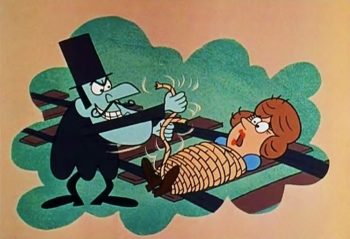 laugh. But though it gets no respect now, melodrama was a reigning art form in its day. Because we are interested in all art forms here – at least all the art forms we are presently thinking of; don’t test us – we’re going to consider the most marked characteristics of melodrama. Hat tip to Robert M. Lewis’ From Traveling Show to Vaudeville, an excellent review of American entertainment.
laugh. But though it gets no respect now, melodrama was a reigning art form in its day. Because we are interested in all art forms here – at least all the art forms we are presently thinking of; don’t test us – we’re going to consider the most marked characteristics of melodrama. Hat tip to Robert M. Lewis’ From Traveling Show to Vaudeville, an excellent review of American entertainment.
Melodrama was, first of all, sensationalist. Well, yes, you say. By definition. And this is so. But melodrama brewed a distinct flavor of sensationalism. Melodrama was firmly grounded in the present day and in next-door locales. There was no once upon a time, no exotic, far-off lands. Nor were there the more or less than human – elves or aliens, superheroes or sorcerers. Melodrama was populated by at least the types of real people, cads and country boys and salesgirls.
And that made it, perhaps, all the more wrenching when drama burst through the familiar with violence, both literal and metaphorical. Improbable dangers and extravagant disasters charged melodrama. Acts of God, bloody deeds of villainy, and blind, mechanical violence were all conjured to create excitement and robust physicality. Think of unpleasant yet unlikely ways to die, all of which require vigorous action to escape, inflict, or both. The writers of the melodramas did. That is why their heroes braved bullets and earthquakes, and their heroines were pushed off bridges and thrown beneath freight elevators and, yes, tied to railroad tracks.
Yet the danger that stalked the heroines of melodrama was not only physical. It was also moral. The popular melodrama Rosina Meadows (1841) was the tragedy of a young woman robbed of her virtue by an urbane scoundrel. (To catch a little of the spirit of melodrama: Both of them die in the last scene – Rosina for no particular reason, her erstwhile lover at the hands of her avenging father.) Rosina exemplifies the idea of young female innocence menaced by male villainy, ever-recurrent in melodrama. For all its full-hearted plunge into violence and crime, melodrama was intensely moralistic. So was its audience. The playwright Porter Emerson Browne marked with vague fondness how devotedly melodrama’s spectators hated the villain and loved the hero and heroine. The journalist Rollin Lynde Hart marked it with acid.
Doubtless there is a great deal of acid that might be spilled on an art form symbolized by a man in a black suit tying a woman to the railroad tracks. Absurdity, histrionics, and stereotypes thread through the image. But there must be something to be said for it as well. It is a striking image, and an indelible one. And if we could receive it as artlessly as the Bowery audiences once did, we might even see pathos within the schmaltz, and human longing beyond the absurdity.







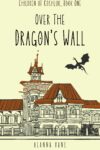




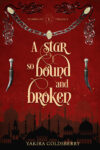
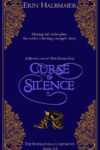
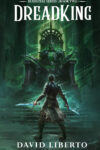

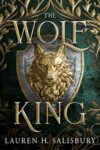














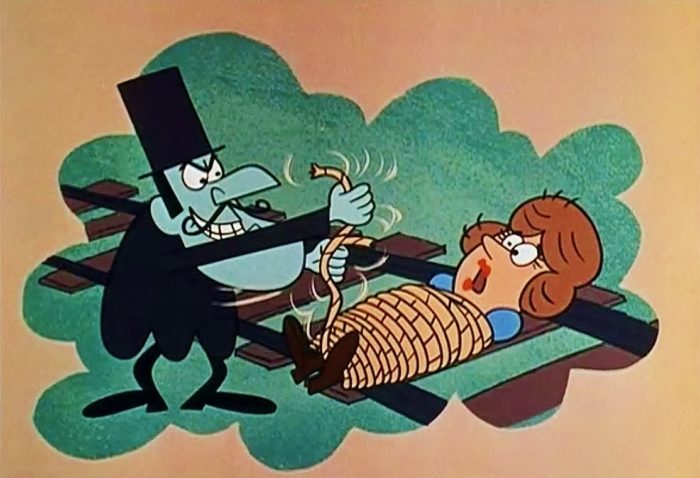









There was a real reason for melodrama, as it was a carryover from pre-electricity days. Actors had to perform “larger than life” on the stage to get their point across acoustically and visually–no big screen TVs or sound systems to help them. After television and modern sound gear came around, it took some time for the theatrics and audience expectations to adapt. You’ll notice a lot of the early sitcoms, even all the way up to the 80s, were acted very much like stage plays. Now, with CGI makeup and more efficient post-production, actors can afford to be more subtle and life-like in their performances.
Melodrama can also be useful for parody, and parody can be useful for humor AND societal critique.
My tastes are probably weird, but I’ve always loved anything that contains both pathos and absurdity. There’s just something satisfying on a meta level when you know an imperfect human is grabbing for perfect things, I guess…? Like there’s a level of really raw honesty and creativity in a lot of bad writing. 6_6
Victor Hugo did melodrama though…Hunchback of Notre Dame and Les Miserables can both be considered that. But they’re great stories, full of pathos and at least some complex characters.
Not all melodrama is created equal…